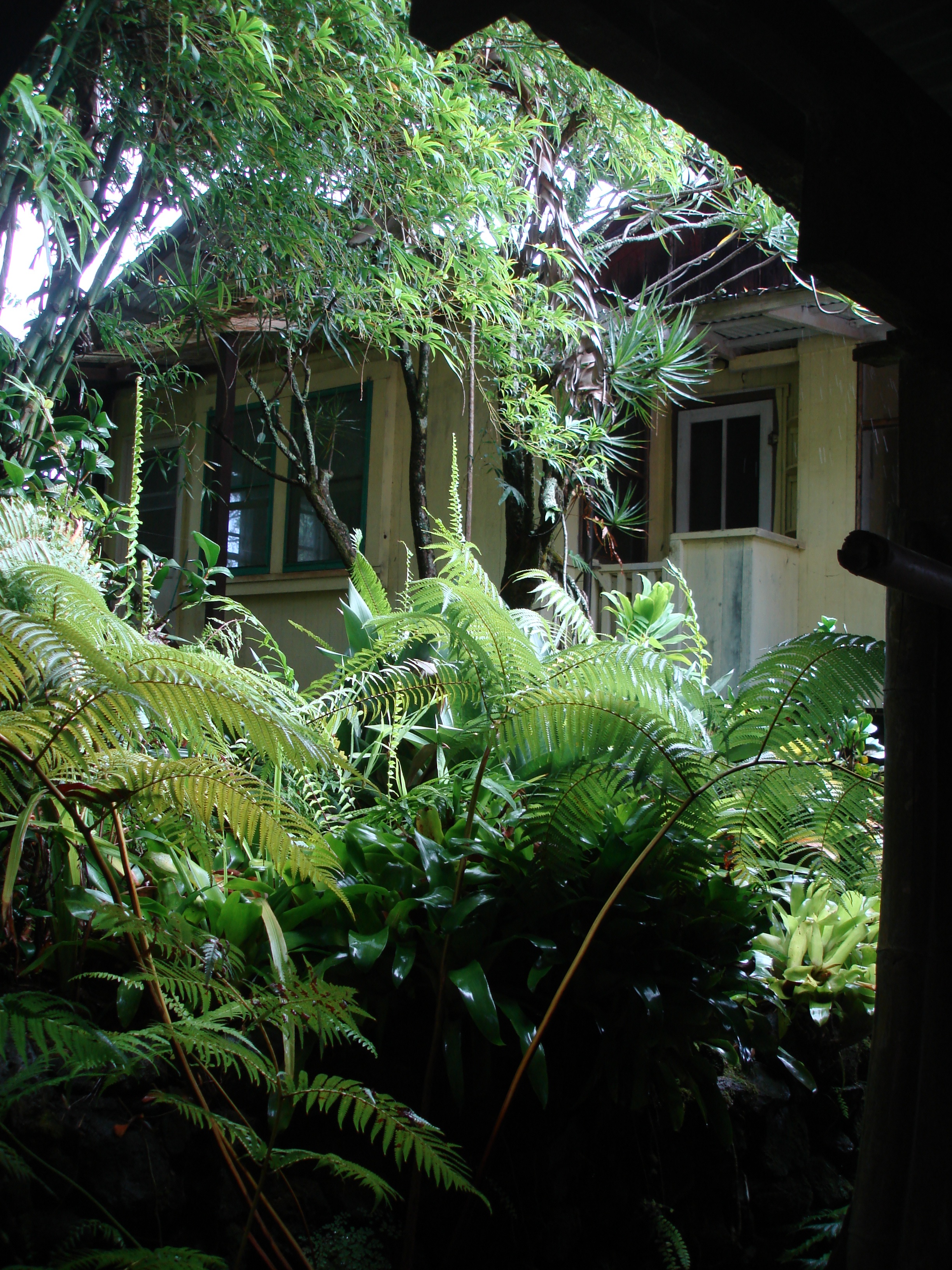No TV. Limited Wi-Fi. No cell phone coverage unless you walk down the road to find a hot spot. Silence from 6.30 p.m. to 6.30 a.m. No microwave. No shoes in the house: a sunny yellow and white relic of plantation days, in a semi-tamed garden of flowers and shrubs and fruit trees from which, to our delight, we discover we will enjoy freshly squeezed juice with our breakfast.
As evening falls, the warm afternoon begins to mellow into cooler night. We catch the last light, walking down the road past the rainforest, the gentle sound of temple bells receding. Our eyes are drawn upward by impossibly tall palms that reach for the sky from amongst pools of gurgling water. Clumps of banana trees perch improbably atop a riot of ferns and flowers high up the sheer hillside. A motorcycle, saddlebags thrown across the backseat, is parked in a little nook between trees. Where, we wonder, is the owner? Does he not worry that someone might steal his bike? Guess not.
We stop for every hanging bloom, some with their faces tilted up, others with heads hanging down. We struggle to name them and settle for simply enjoying their beauty. We marvel at every gnarled root sculpture, barely held back by the incursion of the road. Goats on a farm just off our walking path, turn to watch us, their faces quizzical, as if to say that we are trespassing on their turf. A salamander, confident in its camouflage, makes just one giant frond tremble. It looks like magic: all around, everything else is still. As still as the flat, white cross nailed to a tree: a memorial to a life lost, now memorialized where other life is abundant: foliage sprouting from every crack in the rocks, creepers vined around towering tree trunks, bursting into bloom to interrupt the walls and carpet of green with splashes of bright reds and oranges and purple.
The muted rush of water reaches our ears before we see the pools and cascading falls below a nearly hundred year old stone bridge that divides the gulch through which we walk. Not a stray soda can or food wrapper or the slightest scrap of litter anywhere: the sign promising a $1000 fine must help. As we walk back and the light begins to fade, the ambient chorus begins: an increasingly urgent chirping and calling, as if families are gathering together before night falls.
This is the country in which we find ourselves, having booked into Akiko's Buddhist Bed & Breakfast in Wailea Village, an area known to most as Hakalau. We come at the recommendation of Puanani Burgess, from whom any recommendation should be taken seriously if one seeks serenity and community. The scenic drive along the Hamakua coast to get to Akiko's helps prepare us.

"Treehouse" accommodations at Akiko's in Hakalau.
The place is an invitation to be one. To be still. So we can hear the chatter and the whispers of the world around us. Also the croak of the coqui frogs. Akiko gently suggests we might need ear plugs, but we find we don't. Perhaps it is because they are all male sopranos, she says. Plus, the rains come at night, along with soft winds that visit through the open windows to lull us to sleep. The frogs settle into momentary silence, bested by a force more insistent than themselves. It certainly beats the wail of fire engine and ambulance sirens and the roar of motorcycles in the city.
Festivals and Foodshare
Akiko's B & B provides a glimpse of what it is like to live with the simplicity and attention to community that she does. For 16 years she has led the staging of a mochi-pounding festival, making traditional Japanese new year's rice cakes. The event draws hundreds. This year it will happen on December 28.
Smaller numbers gather on Tuesday evenings for a "foodshare" at nearby Hakalau Veterans' Park. Families bring fruits and vegetables and special dishes from their ethnic cuisines --Hawaiian, Thai, Chinese, Japanese, and European staples that have become standard American fare. Some will sell, while others will barter or give away what they have brought.
Once a week, various senior clubs are invited to the Japanese temple across the highway for specially cooked meals that take them back to the better days of their youth. The event is coordinated by Akiko Masuda and Miyo Harumi, a successful Hilo restaurant owner. Funding is provided through an anonymous donor. They are assisted by a small group of volunteers who help prepare, clear and clean after the meal. The over hundred year old Buddhist temple, once the cultural and community hub and now with only about eight members in their 70's & 80's, bustles with 30-40 people laughing, singing and enjoying great Japanese food together!
"It's worth it to see their faces light up, tasting the foods that they remember," says Akiko. She makes it sound so commonsensical, you have to wonder why every community does not do as she and her neighbors do. "It doesn't even cost that much to do," says Akiko. But it is clear that it calls for a different kind of expenditure: commitment and a generosity of heart and soul.
We may not have learned the way of zen yet, but our spirits sing for having had the blessing of this brief retreat.
